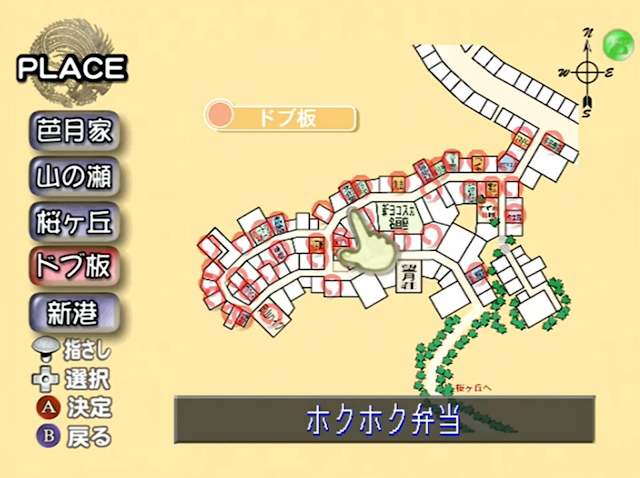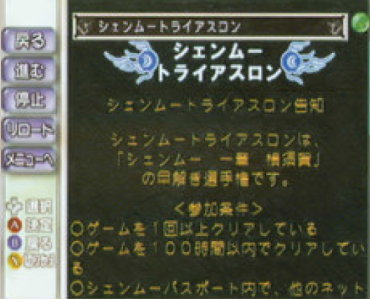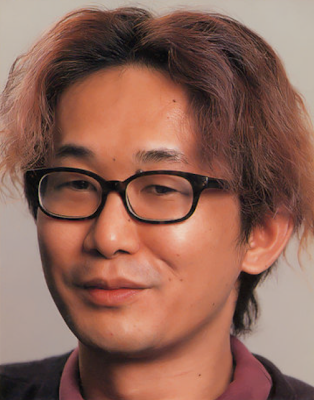When the first game in the Shenmue series was released on the Dreamcast, along with the three game discs was a fourth disc called Shenmue Passport. This was a stand-alone piece of software which acted as a companion to the main game, containing additional content to enhance the player's experience such as music, guide videos and in-depth information about the characters, places and objects in the game. It even made use of the Dreamcast's ability to connect to the Internet to download data and display Shenmue related event news and other messages. (Unfortunately, the Shenmue Passport was not part of Sega's Shenmue I & II re-release in 2018, so the fan community has created an app called Suka Pass that recreates the experience for mobile devices).
In this post we will be translating a magazine interview from shortly after Shenmue's release in February 2000 with senior Sega developer Eigo Kasahara, who oversaw the Shenmue Passport in addition to his role as Planning Director for the main game.
The translation starts below.
The Shenmue Passport uses the network to expand the game world. In the words of the developers themselves, you'll get a sense of the appeal of this software, which is filled with details you can't get just from playing the main game. It will surely inspire you to play the game a second time!
 |
| Shenmue Passport, Japanese version: entry screen (left) and Theater page (right) |
Q: I think players really get fired up when rankings are recorded. There's a tournament going on right now, even (see bottom right).
Kasahara: That's right. Up until now, mini-games were something you could only compete in within the framework of the main game. With Shenmue, we wanted to go beyond that and create something new and interesting by having a nationwide ranking system. We wanted to create somewhere users could compete against each other.
Q: I think this is the first time software has been developed that helps users online, so did you run into any particular problems?
Kasahara: We were very careful about the text of the hints given in Nozomi's Messages. If we simply gave the answers directly, it wouldn't be any fun for the players, and they wouldn't want to go online. Also, how do you know if the player is really stuck or not? This was a tricky part.
 |
| The Shenmue Passport disc (Japanese version) |
Q: Could you give some examples of how that is assessed?
Kasahara: Just about any action the player takes is counted, part of which can be viewed in the Data Review (named "Self-Diagnosis" in the Japanese version) section of the Passport. For example: the number of times Ryo hits a wall, or the number of times he talked to people on each quest, etc. Based on this data, we give hints that are appropriate for the player. So it's not like you can just leave the controller lying around and get a hint if you leave it connected for a while.
Q: One thing that was a surprise to me personally is Urgent Messages. I think the game manufacturer - and more specifically the developers themselves - being directly involved in the support is revolutionary.
Kasahara: We spent a lot of time debugging Shenmue, and tried to look at everything thoroughly, but I still can't deny that there are bugs that appear when you play the game over and over again. Therefore, we thought it would be a good idea to include a feature that would allow us to provide user support in the event that something like that did arise. I guess you could say we took every precaution.
Q: There is a lot of other different content too; how did you go about creating it? For example, one that I think everyone will be interested in is Profiles.
Kasahara: The project members all worked on it together. We already had the character profiles and backgrounds of the neighborhoods which were originally made for the purpose of writing the scripts, so we decided we might as well show them off, and that's how the Shenmue World section was born.
 |
| The Passport will give you a lot of information that you can't find in the main story. If you play the main game after experiencing it, you'll get even more depth. |
Q: How about Theater, which brings together key scenes, or Music, where you can listen to background music?
Kasahara: When you play the game, I think there are scenes at key points that stay with you. We made it so that you can watch them over and over again, and remember the feeling you had when playing.
Q: How did you select the scenes?
Kasahara: I consulted with Yu-san and the designer [Masanori] Oe, while making the selections. Scenes were chosen with the criteria of being iconic, or moving, or cool, and so on.
Q; How has the response been from players?
Kasahara: Well, on the BBS*, I was happy to read comments from players who have gone online saying "It's 1.5 times more fun!" compared to not being online. It would be great if people who aren't yet online could read posts like that.
*BBS = Bulletin Board System, referring to Sega's early online Shenmue forums.
Q: This may be a little off-topic from the Passport, but I was surprised to see that the rankings can also be viewed from i-mode* devices - you can check your rankings on the go.
*"i-mode" was the name of a mobile technology announced in 1999 for connection to the Internet, that was provided as an optional pay service for users of DoCoMo mobile phones.
Kasahara: SEGA is a computer manufacturer, in a sense. And Yu-san's opinion was that "Even the website of a regular factory is meticulously designed. SEGA needs to start doing those kinds of things, too". So I approached him and asked him what we could do right away, and he encouraged us to take on new challenges, if we thought we could do them. So it was an expression of our desire to do everything we could to uphold the name of the company.
Q: It may be too early to say, but will there be a Shenmue Passport with the next game as well?
Checkpoint 1: Shenmue World is a Must View for All Players
 |
| The Profiles section is one of Kasahara-san's favorite parts. Enjoy reading about the world of Shenmue. |
Checkpoint 2: Shenmue Triathlon, Made Possible through Internet Connection
 |
| The Shenmue Triathlon is like a special bonus that was organized all of a sudden. Are there other hidden rankings like this one?! |
Checkpoint 3: Exchange Prizes for Plushies
In the Passport's Everyone's Space are animal plushies that can only be obtained by swapping with certain prize items. The reason for these being animals is because "we had a lot of different ideas, but in the end we decided to make them unified rather than disparate. So, we asked for the cat stuffed toy that was just about to be a slot machine prize - or I should say, we seized it for ourselves our use and that's how we ended up with what we have now (laughs)" - Kasahara.
 |
| Prize items can be exchanged for cute plushies. Perhaps they're a bit too fancy for Ryo to own?! |
Win Fabulous Prizes in the Network Ranking Competition
 | |
| Target games vary from week to week. Enter for the mini-games you're strongest at! |
- January 18th - Round One Notification: All 9 games played. Award for 1st place in each game.
- January 25th - Round One Give-away Announcement: TIMEX Shenmue original watch
- January 31st, 18:30 - Round One Deadline
- February 1st - Round One Results Announcement
- February 1st - Round Two Notification: 70-man Battle. Awards for 1~10th place. Give-away announcement.
- February 7th, 0:00 - Round Two Deadline
- February 8th - Round Two Results Announcement
- February 8th - Round Three Notification: games announcement, give-away announcement
- February 14th, 0:00 - Round Three Deadline
- February 15th - Round Three Results Announcement
- February 15th - Round Four Notification: games announcement, give-away announcement



No comments:
Post a Comment